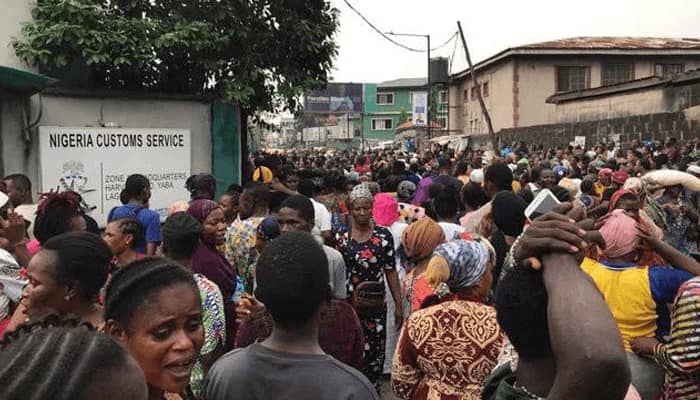NYERERE PLANS TO MAKE ABIA STATE THE ECONOMIC POWER BASE OF IGBO LAND By Nwosu Chukwuemeka


In the 2014 National Conference, Igbo politicians were divided in arriving at a common agenda to take to the conference as the Igbo position in negotiating the provisions of a new constitution for our country. Although these politicians had always been emotionally attached to a few common concerns about such matters as the following:
· The creation of an additional state in the southeast, to bring the eastern zone to parity with other zonal stakeholders.
· The desire for an Igbo president that could be made realizable by zoning the presidency among the six geopolitical zones in the country.
· The retention of states as federating units without the power of resource control.
They were largely unprepared for the conference, and never contemplated about other fundamental issues concerning how the existing Igbo states will ensure the democratic elections of the best quality of governors that can create the proper democratic environments to:
· Enable Igbo citizens to live and contribute their enterprise for the development of Igbo land.
· Develop and grow these eastern states to have sound economic foundation.
· Precipitate in each eastern state the much needed economic independence through the emergence of its economic power.
The creation and existence of states as constituting the principal federating units, without the power of resource control, has left each state with limited autonomy and access to its resources. This development has deprived each eastern state the opportunity of exploiting its own natural resources, and the wisdom to use the Igbo enterprise – inventions in practical terms – to develop and operate within its boundary as a distinct economic zone. This brings us to the point of reflection on what I consider to be the most important Igbo-project for our southeastern governors.
The most important objective that any Igbo politician, who aspires to govern any of the five eastern states must have in mind to achieve, in furtherance of the realization of that crucial dream for the true and permanent freedom of the Igbos from this one-nation fixation called Nigeria, is to evolve visionary programs that can enable the state to create, develop and grow a sustainable and powerful economic foundation.
In Nigeria of today, because of the absence of strong economic foundations in the southeast states, the Igbos show high emigration tendency to other major Nigerian cities (such as Lagos, Kaduna, Kano, Jos, Abuja) with stronger economic opportunities for exerting a living. They are known to constitute a larger portion of the population of residents of these states, after the indigenes of the state. This emigrant nature of the Igbos has caused them to find themselves to be victims of such regular problems arising from insecurity and all forms of terrorism that this country has known or is currently witnessing. One can easily recall the problems of military coups and counter coups in the 1960s and the attendant genocide against the Igbo race. Also the Sharia riots and other forms of ethno-religious riots of the past years had resulted in the massive killing of Igbos. The same disheartening story is current being told about the insecurity situation arising from the Boko Haram insurgency in the Northeast, and sporadic bombing operations in other states in the northern Nigeria.
Saving the lives of the Igbos living in the eastern states and other parts of the Nigerian society requires that the “arms of good governance” in every Igbo state must embrace the imperative for security of lives and property of all Igbo indigenes in the state. This also translates to a corresponding imperative that the same “arms of good governance” in every Igbo state in Nigeria must transform its economic environment to one that guarantees a global economic power to the state. Once the security of lives of every Igbo citizen is guaranteed by the practice of good governance in every state of Igbo land, then it will become possible to harness the great enterprise capacity of Igbos – just like the late Chief Chukwuemeka Odumegwu Ojukwu did during the Nigerian-Biafra Civil War to help Biafran Army invent unique military equipments used to prosecute the war – as the most critical instrument for the Igbo race to utilize for the creation, development and continuous growth of that economic power in the land of the Igbos.
Irrespective of the fact that the 1999 constitution of the Federal Republic of Nigeria (as Amended) does not permit any federating unit to function as an autonomous economic zone, the “arms of good governance” can still be so wonderfully extended to make it possible for governors of eastern states to wisely harness the abundant resources in the region and exploit the Igbo enterprise to develop the strongest and most sustainable Igbo economy in the states of the eastern Nigeria.
That is why in Abia State of today, as the Governorship Elections of February 28, 2015 approaches nearer evewryday, the concern and search for a quality hand of leadership for the state calls for the perfect hands of a man with the vision to exploit our Igbo enterprise to the fullest, to judiciously deploy the state’s resources in the creation of an enduring economic foundation for the benefit of the current and future generations of Igbos in Abia State and other parts of eastern Nigeria; and even beyond.
Before you regurgitate the northern leaders’ mantra that southerners are not good in leadership, especially in public services involving the governance of a state, and there no need in wondering to look for one, remember the story of Governor Rochas Okorocha of Imo State, a southeast governor, who has turned Imo State into a true story of success. And one of the golden minds in Igbo land of today, who is capable of replicating the success story of Rochas Okorocha in Abia State, by visualizing a true picture of the future of a modern Abia state, rests in the visionary mind of Nyerere Anyim, the APC Governorship Candidate for Abia State in the February 2015 elections, a known associate and confidant of Governor Rochas Okorocha for more than two decades.
Talking with Nyerere, and in addition, reading his campaign manifesto (which can be viewed at www.slideshare.net and www.youtube.com), you will come to the conclusion that Nyerere is a man of uncommon vision, who is already sharing his mental image of a rebuilt Abia State. He says in his manifesto: “I have a vision to rebuild Abia State”.
· A vision of a state with a strong and sustainable economic foundation, built from Igbo enterprise, for the present and future generation of Abians, Igbos and Nigerians in general.
· A vision of a state where economic development will be predicated on a sound industrialization policy, driven by massive investments in education, to create and sustain the global economic power of the state.
· A vision of a state where agricultural revolution will stimulate the greater productivity of our farm cash crops – through mechanized farming, development of farm settlements, operation of compulsory small scale farming schemes – to provide food security to Abians and residents of the state; and raw materials for agro-processing industries; as well as turn Abia State into the biggest exporter of agricultural products, which will boost the internal revenue base of the state and help create the agro-dimension of its economic power.
· A vision of a state where governance is rendered with the scrutinizing hands of transparency and accountability in the receipts and expenditure of public funds, to put an end to the brazen looting of the public treasury.
· A vision of a state where all critical matters affecting the welfare of the people and arising from underdevelopment will be fully addressed and put to rest.
· A vision of a state where the pervasive impacts of poverty in our Igbo society will be mitigated to the lowest level with the execution of government’s wealth creation programs and business empowerments.
· A vision of a state where no man is oppressed, for the virtues of justice, equity and rule of Law will be strictly upheld.
· A vision of a state that reflects a true egalitarian society, where people with singleness of heart and unity of purpose will possess their economic foundation and power.
· A vision of a state that protects the lives and properties of all indigenes and residents of the state, as well as their economic rights to better living conditions.
Nyerere is one of the Igbo Leaders of Thought and a member of the Abia Think Tank, who expresses the opinion that an Igbo-state must be seen like a company. By this reasoning, he means that the main business of a “state-company” is to engage in economic activities that will best benefit its citizens. To win the war of achieving a stronger economic power, Nyerere thinks that a good governor must have an uncommon mindset on how to innovate, by engaging in small experiments that can provably develop new industrial projects, to let Abia State embrace new technologies that can enlarge and improve the productive capacities of the state, and to focus on providing the needs of all in the “state-company”.
To this effect, Nyerere plans to harness the Igbo enterprise to stimulate startup companies, and restart dormant ones, with path-breaking technological inventions or true innovations, the products of which can give Abia State global gateways to foreign exchange from exports, and enrich the purse of the state with stupendous foreign exchange reserve.
The achievement of this objective will require that he, Nyerere, creates the enabling environment that can motivate and compel Igbo professionals in the Diaspora, and Igbos that live in other parts of the country as emigrants, to heed the home call to help grow the economic power of Abia State. This is a vision encapsulated to reduce the pressure for Igbos to emigrate to other parts of the country to earn their living, and for Igbo Diaspora professionals to return home and contribute their collective wisdom in the pool of Igbo enterprise, and to grow the economy of Abia State into an overwhelming Igbo economic power located in the southeast of Nigeria geopolitical zone.
Also encompassed in his mental picturing for the rebuilding of Abia State with a strong economic foundation, Nyerere plans to construct the bridges linking Ohafia town in Abia State with Cross River and Akwa Ibom States, so that Igbo products and services can easily, and more economically, enter into these unserved markets in Abias’s neighbouring states.
Moreover, in order to increase the number of urban cities in Abia State, and lessen migration from rural areas to urban cities, Nyerere plans to build a new modern city out of the old traditional town of Aro Chukwu in Abia State. This urbanization of more rural towns will gradually extend to Abiriba, Ohafia, and Isuikwuato.
And to finally innovate from the stateside, Nyerere eyes to capture the wasteful gap between Rivers State and Abia State, by the ultra-modern estate development of Obuaku City in Abia State.
All these are ‘Special Projects’ about how Nyerere plans to ‘change’ Abia State into an economic power. He is convinced that living as one economic community in Abia State is necessary in order to create sustainable and mutually supportive conditions for enduring business relationships, and for the collective promotion of our interests as Igbos in Igbo land. He is determined to execute his lofty economic policy and bequeath it as a true and lasting legacy, for the prospect of a democratically stable economic order, which our struggles and sacrifices as Igbos have brought about at last, through the hands of his visionary leadership.



